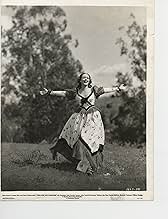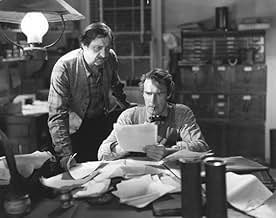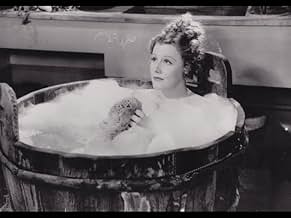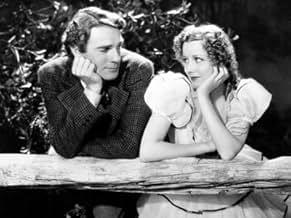Pennsylvania, 1859. Railroad tycoon Brennan (Alan Hale) is muscling in on oil-drilling farmers, led by Peter Cortland (Randolph Scott). Cortland must try to save their oil business, while al... Read allPennsylvania, 1859. Railroad tycoon Brennan (Alan Hale) is muscling in on oil-drilling farmers, led by Peter Cortland (Randolph Scott). Cortland must try to save their oil business, while also saving his marriage to Sally (Irene Dunne).Pennsylvania, 1859. Railroad tycoon Brennan (Alan Hale) is muscling in on oil-drilling farmers, led by Peter Cortland (Randolph Scott). Cortland must try to save their oil business, while also saving his marriage to Sally (Irene Dunne).
- Director
- Writers
- Stars
- Student
- (uncredited)
- Director
- Writers
- All cast & crew
- Production, box office & more at IMDbPro
Featured reviews
For reasons I don't understand, except for Showboat she was not given a singing leading man. The story lines were rewritten to give her all the good songs and the leading man none. Not that Donald Woods in Sweet Adeline or Douglas Fairbanks, Jr. in Joy of Living or Randolph Scott in Roberta and High Wide and Handsome had any ambitions to sing, but it might have been nice to have her teamed with someone like Allan Jones again as she was in Showboat.
High Wide and Handsome is set in western Pennsylvania just after Edwin L. Drake invented the first practical oil derrick to drill for the stuff. Up to that time oil was considered a nuisance at best, a positive calamity at worst for some poor farmer who had the stuff oozing through to his soil. Randolph Scott is such a farmer who has the idea of marketing for heating fuel.
Others agree with him including Alan Hale who is in a part normally reserved for Edward Arnold. He's the boss of the railroad and who would be shipping the stuff and at the rate he determines, but him only.
Not beaten Scott conceives the idea of the first oil pipeline and then its a fight to the finish with the Hale and the railroad. By the way in real life this is how John D. Rockefeller cornered the oil market and gave the Rockefeller family the wealth it enjoys today.
Irene Dunne is in a medicine show that breaks down and she, Raymond Walburn and William Frawley are given shelter by Scott and his grandmother Elizabeth Patterson. Of course the usual boy/girl stuff happens.
Scott's an earnest of guy, but a bit of a prude as well. Later on when Dunne aids another entertainer in trouble, Dorothy Lamour, Scott and she break up when he finds the two of them trying to put over an act in a saloon to get her hired.
Two very big songs for Jerome Kern and Oscar Hammerstein, II came out of High Wide and Handsome both sung by Dunne, Can I Forget You and The Folks Who Live On The Hill. Again this was a case of one hand washing the other as Paramount no doubt convinced the leading singer in America who by no coincidence was a Paramount contact player to record them and plug them on his radio show. Bing Crosby's records of them are classic and they sold a few platters back in the day. In fact why didn't they have Bing in this film? It certainly had more of a budget than the musicals Paramount was giving him.
Other villains in High Wide and Handsome are Charles Bickford and Irving Pichel. Bickford is just a plug ugly who does Hale's dirty work and probably would pay Hale to do it for him as he and Scott hate each other and that's made clear right at the beginning of the film. Irving Pichel plays a strange Puritan type individual, self appointed keeper of the community morals. His was a strangely underdeveloped character in the script that Oscar Hammerstein, II wrote.
Rouben Mamoulian who directed his fair share of musicals on screen and on the stage did a good job with his cast. And you can never go wrong listening and singing Jerome Kern's wonderful songs.
Here Dunne plays a singer in a traveling snake oil show run by her father (Raymond Walburn). They bottle "rock oil" and sell it as an elixir. Dunne sings and dances in the show while daddy hawks the tonic. William Frawley plays a fake Indian who is also part of the show. After their wagon burns down, they are taken in by a local farmer (Randolph Scott) and his grandmother (Elizabeth Patterson). Of course Scott and Dunne fall in love, but Scott is sidetracked by his ideas for drilling for oil in 1850s Pennsylvania.
Songs, romance, and action combine to make this an unusual film as the couple battles the local bible thumpers as well as the crooked railroad men, led by Alan Hale. Along the way Dunne rescues a saloon singer (Dorothy Lamour) and runs away with a traveling circus. They pack a lot of story into this 112-minute film.
Dunne is, as always, a total pleasure to watch. She gets to sing almost all the songs in this musical (Scott never sings) and duets with Lamour on "Allegheny Al." The best song is the wonderful "The Folks Who Live on the Hill," which Dunne sings in closeup with a gentle breeze rustling apple blossoms and her lace bonnet. Scott is good in a role usually played by Joel McCrea, but Scott and Dunne have good chemistry. They also worked together in Roberta and My Favorite Wife.
Supporting cast is fine, headed by Patterson as the feisty grandmother, Walburn as the father, Frawley as the Indian (he also gets a number), Ben Blue as a mute, Lamour as the dumb-cluck who sings "The Things I Want" in fabulous close-up, Hale as the corrupt railroad man, Helen Lowell as a gossip, Irving Pichel as the bible thumper, and Akim Tamiroff as the saloon owner. Also of note is Charles Bickford is the bully. Bickford had starred with Dunne is the previous No Other Woman.
Worth looking for.
Paramount obviously had high hopes for this movie, assigning Rouben Mamoulian to direct and cinematographers Vic Milner and Theodore Sparkuhl to supervise the cameras. The cast is likewise excellent: Dorothy Lamour, Raymond Walburn, William Frawley, Charles Bickford, and Akim Tamiroff are just two of the actors adding their talents to the spectacle.
Unhappily, the score is not among the best of the Hammerstein-Kern efforts. Other reviewers have expressed their admiration for Miss Dunne's rendition of the sentimental "The Folks Who Live on the Hill." I prefer Frawley's "Will You Marry Me Tomorrow, Maria?", but there isn't much to it, and and old-fashioned orchestration -- suitable for the 1860 setting -- makes the songs unmemorable.
What's left is the "little guys against greedy capitalists", and there are some beautifully shot sequences, especially when the circus (complete with elephants) comes to the rescue of the men building the pipeline. Yet while the camerawork makes the movie always engaging, the tired story and bad score limit it to that.
Did you know
- TriviaAccording to Margaret J. Bailey's book on Hollywood costume design of the 1930's, "Those Glorious Glamour Years," apple trees in blossom were required for some scenes. Frost in California had decimated the apple trees, so studio technicians at Paramount Studios worked overnight, peeling rosebuds down and sticking them on bare trees with maple syrup to simulate an apple orchard in full blossom.
- Quotes
Mac: I'll bet Sally will be glad to get away from here.
Doc Watterson: You think so, Mac?
Mac: Sure. She's always fightin' with that Cortlandt fella. She hates the sight of him.
Doc Watterson: You know human nature, don't you Mac?
Mac: From A to Z.
Doc Watterson: You must have skipped W. The women come under W.
- How long is High, Wide and Handsome?Powered by Alexa
Details
Box office
- Budget
- $1,900,000 (estimated)
- Runtime1 hour 50 minutes
- Color
- Aspect ratio
- 1.37 : 1
Contribute to this page






































